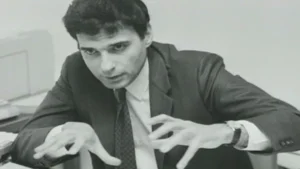An Unreasonable Man (2006) review
Dir. Henriette Mantel and Steve Skrovan
By: Steve Pulaski
Rating: ★★★
Doubling-back to watch political documentaries from the 2000s further emphasizes the wild polarization of the modern culture. An Unreasonable Man is a documentary that seeks to profile longtime consumer advocate and once-perennial presidential candidate Ralph Nader. Even when the film’s many talking heads spend considerable stretches of time bedazzling the life and legacy of Nader, there is still an undercurrent of skepticism and dismissiveness emanating from former associates and campaign employees alike.
That kind of partisanship in a political doc is rare in the modern day. Like our entertainment, our consumption of political media and content is regimented to our tastes. Watching An Unreasonable Man is a throwback in itself. It’s the kind of movie an older demographic would see airing on PBS or the like and perhaps find themselves drawn to, out of a pure desire for knowledge. Now, gone are the days of channel-surfing and political open-mindedness. The good thing for Ralph Nader, however, is his name has become far less charged in recent years, so present is the ability to look at his body of work with a depth of research and contemporary resonance that obviously didn’t exist in decades past.

Henriette Mantel and Steve Skrovan’s documentary gets its title from a quote from George Bernard Show; to paraphrase, a reasonable man will adapt himself to the world whereas the unreasonable one will try to adapt the world to himself. “All progress depends on the unreasonable man.”
Nader of all people fits the description. For decades, he’s been a thorn in the ass of corporations, most notably the auto industry. He successfully campaign for auto safety in the late 1950s and 1960s, raising public awareness to the fact that the still-new and revolutionary automobiles were being designed with sleekness and status in mind; not necessarily safety. Fighting Chevrolet, General Motors, and more gave way to Nader’s consumer advocacy movement that garnered thousands of loyal volunteers dubbed “Nader’s Raiders.” Fueled by the hunger to change institutional practices and give the taxpayers a lobbying group of their own, Nader’s promise of stronger regulations began to take shape, but not without a great deal of legwork.
Nader’s cause was behooved greatly by the labor, civil rights, women’s, and antiwar movements of the 1960s and 1970s. Such common, shared ideologies unintentionally did their part in helping his causes seem less radical and more in-line with common sense. Corporations are protected by million-dollar lawyers and special interest groups tailored to keeping them in power with limited liability. Why shouldn’t the individuals who buy these business’ products and make them the titanic forces of our culture not be entitled to some reasonable expectation of safety and protection? It was one of the chief principles in Nader’s book Unsafe at Any Speed: The Designed-In Dangers of the American Automobile, a bestseller upon its release in 1965. The book was one of the many reasons the United States Department of Transportation was created.

An Unreasonable Man has a certain aesthetic dryness to it. Much of it is on-camera interviews with individuals, as well as archival footage, scored to light jazz and easy-listening music. At over two hours long, its presentation does prompt tune-out by virtue of its slowness. It does regain its footing when it addresses the proverbial elephant in the room in the second hour.
An Unreasonable Man shows how Nader became synonymous with consumer rights activism via his published works, public appearances, rallies, and research. At its core, this is a talking head-driven documentary, with notable individuals such as former Nixon consultant Pat Buchanan; talk-show host Phil Donahue; and investigative journalist James Ridgeway. Also interviewed are former members of Nader’s Raiders, who would later denounce the activist, specifically after his role in George W. Bush’s successful yet controversial election as President in 2000.
Nader is forever known as the Green Party nominee for president in the 2000 election, his second formal bid for the Oval Office. Despite receiving little media coverage and being prohibited from participating in the debates between Bush and Al Gore, Nader and his running mate Winona LaDuke no less appeared on the ballot in 43 states (including DC) and received over 2.8 million votes (2.74%). To date, he is widely blamed for Al Gore losing the contested election, which eventually led to a recount that took over a month to complete.
Therein lies the great irony of Ralph Nader’s legacy. He wasn’t perceived as a factor in the 2000 presidential election in the months leading up. But because the Democratic candidate lost, he became an easy scapegoat. Nevermind the pitfalls of Gore’s own campaign. It wasn’t until Gore lost was Nader deemed a “spoiler.” As far as damage control goes, this doc isn’t simply content with trying to absolve Nader for the sin of exercising his right to run for president. It shows why Nader was qualified to run for office, and frankly, the depths of his platform and belief system, which puts many of our sorry politicians to shame.
NOTE: As of this writing, An Unreasonable Man is available to watch on YouTube, free of charge.
Directed by: Henriette Mantel and Steve Skrovan.
About Steve Pulaski
Steve Pulaski has been reviewing movies since 2009 for a barrage of different outlets. He graduated North Central College in 2018 and currently works as an on-air radio personality. He also hosts a weekly movie podcast called "Sleepless with Steve," dedicated to film and the film industry, on his YouTube channel. In addition to writing, he's a die-hard Chicago Bears fan and has two cats, appropriately named Siskel and Ebert!


